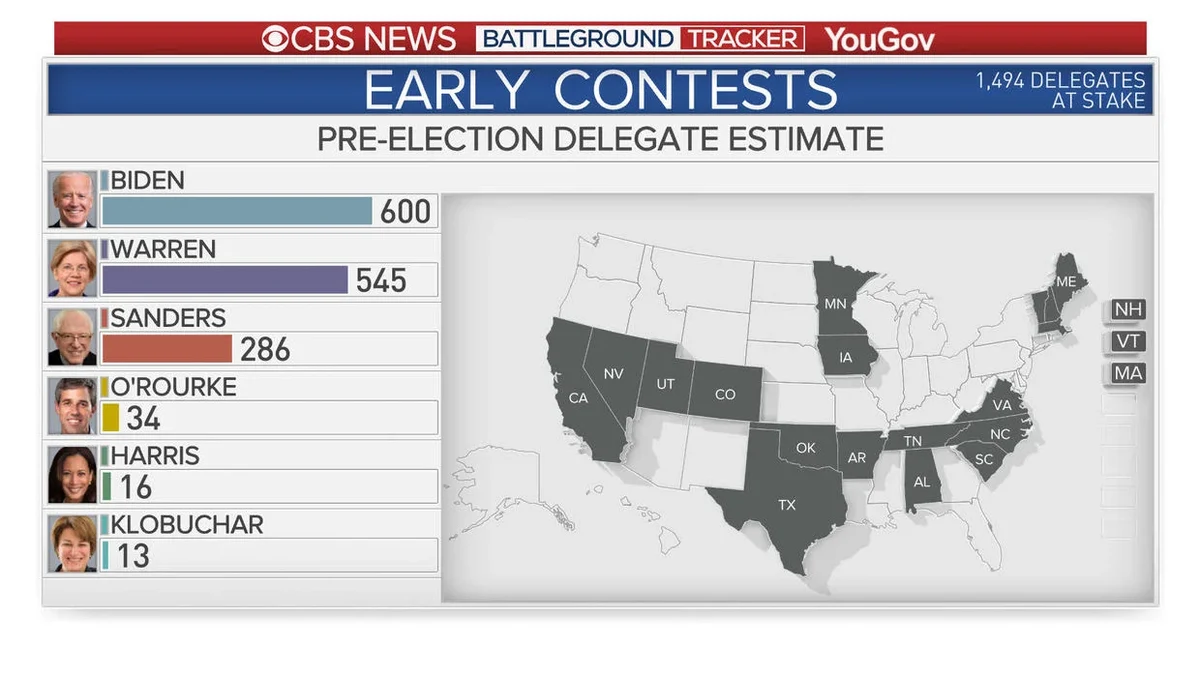This poll is a part of the CBS News/YouGov Tracker of convention delegates, which measures the estimated winner of Democratic convention delegates in early primary and caucus states.
Senator Elizabeth Warren is rising in the Democratic race for president, but she is narrowly behind former Vice President Joe Biden in the third wave of the CBS/YouGov Delegate Model.
The CBS/YouGov Delegate Model tracks the estimated winner of convention delegates in early primary and caucus states. America is still six months away from any delegates actually being chosen when the Iowa Democratic caucuses happen on February 3, but the polling data indicates how the race is evolving.
While Biden holds an estimated 600 early delegates, Warren is narrowly behind him with an estimated 545 delegates of the share available through Super Tuesday. Following Warren is Senator Bernie Sanders with a predicted 286 delegates. Those three are the only candidates with triple digits, and they are outpacing the estimations for Beto O’Rourke, Senator Kamala Harris, and Senator Amy Klobuchar.
Image: CBS News
The YouGov polls show a fairly tight three-way race entering the third Democratic Primary Debate on Thursday. The remaining candidates do not appear to be getting significant traction among Democratic primary voters, based on surveys to-date, and some are changing loyalties.
Warren’s latest rise comes not at Biden’s expense, but rather, the lower-tier candidates. As Warren’s projected delegate count increases, much of that gain is coming from Harris, according to a CBS analysis of the data. Sanders is also drawing support from lower-tier candidates, but not as significantly as Warren.
The three Democratic primary leaders are favored largely for their experience and policy stances. Among likely voters considering each candidate, Biden earns support based on his experience as Barack Obama’s Vice President (87%), his time in the US Senate (59%), and his policy stances (59%).
Warren earns support among likely voters because of her policy stances (90%), her time in the Senate (71%), and her background before going to Washington (57%), which includes time teaching at Harvard University and helping create the Consumer Financial Protection Bureau. Sanders is favored by likely voters for his policy stances (85%), his time in the Senate (60%), and his 2016 campaign for the Democratic nomination (53%).
Related: Switching Lanes? The Top Tier of Democratic Primary Candidates
Methodology: This CBS News/YouGov survey is conducted online between August 28 – September 4, 2019. A representative sample of 16,525 registered voters in 18 states expected to hold early primaries and caucuses (Alabama, Arkansas, California, Colorado, Iowa, Maine, Massachusetts, Minnesota, Nevada, New Hampshire, North Carolina, Oklahoma, South Carolina, Tennessee, Texas, Utah, Vermont, Virginia) was selected. This sample includes 7,804 self-identified Democrats and Democratic-leaning Independents. This sample was weighted according to gender, age, race, and education based on the American Community Survey, conducted by the U.S. Bureau of the Census, as well as 2016 Presidential vote. The margin of error is +/- 1.8 points.
You can see additional details on the polling and methodology from the September 4 survey here: CBS/YouGov Delegate Model Results











